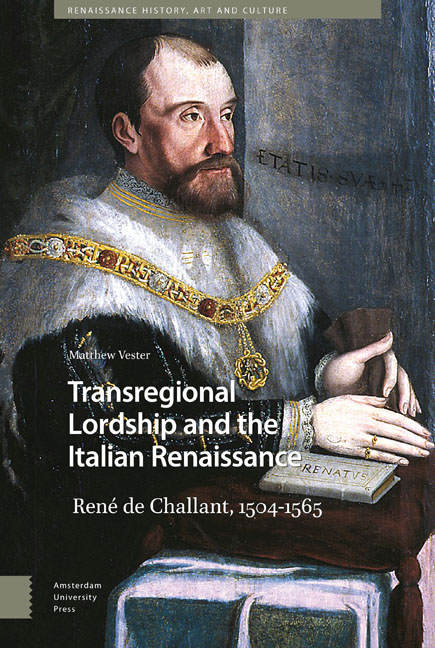Book contents
- Frontmatter
- Contents
- Maps and Tables
- Abbreviations
- Acknowledgments
- 1 On the edge of the Italian Renaissance
- 2 René's early career to 1536
- 3 René's growing influence during the war years, 1536-1553
- 4 René and Duke Emanuel Filibert
- 5 Kinship and noble life
- 6 The Challant political networks
- 7 Finance and brokerage
- 8 Lordship
- 9 The embodiment of spatial politics
- About the author
- Index
5 - Kinship and noble life
Published online by Cambridge University Press: 21 November 2020
- Frontmatter
- Contents
- Maps and Tables
- Abbreviations
- Acknowledgments
- 1 On the edge of the Italian Renaissance
- 2 René's early career to 1536
- 3 René's growing influence during the war years, 1536-1553
- 4 René and Duke Emanuel Filibert
- 5 Kinship and noble life
- 6 The Challant political networks
- 7 Finance and brokerage
- 8 Lordship
- 9 The embodiment of spatial politics
- About the author
- Index
Summary
Abstract
The formal and informal political authority of René de Challant was rooted in his kin relations. He inherited titles, lands, and relationships through the ancestors of both of his parents, and through affinal kin. The territorial dimension of the connections spread from northern Italy to the transalpine Sabaudian lands, and from Iberia to the Swiss lands and the Franche-Comté. René's family interacted socially with other nobles in the Valle d’Aosta and elsewhere, consolidating their shared position as members of the elite but also engaging in sharp legal conflicts when their landed or jurisdictional interests collided.
Key words: kinship, marriage, noble sociability, law
The idea that family members were political assets for early modern nobility is taken for granted by historians. Noble diplomats, for example, depended heavily on the assistance of kin. Noble diplomatic networks were ‘family firms’, whose existence ‘demands a more broadly-conceived notion of “the political” – one marked more by the informal social politics of families, factions, and negotiation’. Cardinal Jean de Lorraine (1498-1550) was one such noble who was more than just a diplomat; he was the brother of Duke Antoine de Lorraine and Duke Claude de Guise and played a key role in holding together the fragile mosaic of jurisdictions ruled by the different branches of his family. A favorite of Francis I, he participated in Franco-Imperial conferences in Roussillon and Nice in 1538 and exemplifies the idea of the noble ‘family firm’. René was also part of such a family grouping that offered support in a variety of ways.
However, within noble families, there was a constant tension between individual desires and interests and the structural pressure to defend the well-being of the family as a whole. This operated both in terms of individual members and with respect to various branches of a kin group. Relations between collateral lines were like relations between brothers – these inevitably involved mutual service and solidarity, but also conflict. This was true both for noble families and for ruling dynasties: ‘A dynasty was in effect a lineage, and not immune from either demographic constraints or kinship relations.’ The decision by Jean-François de Mahuet to resign his high office and subordinate his ‘individual desire’ to his ‘familial duty’ was described by his historian as an example of the ‘dark side of a dynastic culture’.
- Type
- Chapter
- Information
- Transregional Lordship and the Italian RenaissanceRené de Challant, 1504–1565, pp. 139 - 178Publisher: Amsterdam University PressPrint publication year: 2020



